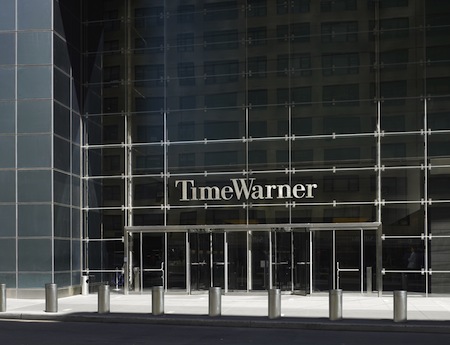It’s Official: AT&T to Buy Time Warner

The smarter way to stay on top of broadcasting and cable industry. Sign up below
You are now subscribed
Your newsletter sign-up was successful
AT&T said Saturday night that reach an agreement with Time Warner to acquire the media company for $107.50 in cash and stock.
At a time when the media landscape appears uncertain because of disruption caused by digital technology, the deal would create a giant in both distribution and content in the U.S. AT&T also has distribution in Mexico and Latin America, while Time Warner operates network around the world.
“This is a perfect match of two companies with complementary strengths who can bring a fresh approach to how the media and communications industry works for customers, content creators, distributors and advertisers,” said Randall Stephenson, chairman and CEO.of AT&T, which owns DirecTV.
“Premium content always wins. It has been true on the big screen, the TV screen and now it’s proving true on the mobile screen,” Stephenson said. “We’ll have the world’s best premium content with the networks to deliver it to every screen. A big customer pain point is paying for content once but not being able to access it on any device, anywhere. Our goal is to solve that. We intend to give customers unmatched choice, quality, value and experiences that will define the future of media and communications.”
Two years ago, Time Warner rejected a takeover bid from Rupert Murdoch’s 21st Century Fox valued at $85 a share. Since then, under CEO Jeff Bewkes, Time Warner has boosted its revenue and earnings, started an over-the-top business with HBO and its Turner unit has signed deals that are expected to boost the fees it gets from distributors by double digits for the next several years. Time Warner also owns the Warner Bros. studio, which produces movies and TV shows. Time Warner also owns a stake in the Hulu streaming service along with Comcast, Fox and The Walt Disney Co.
“This is a great day for Time Warner and its shareholders. Combining with AT&T dramatically accelerates our ability to deliver our great brands and premium content to consumers on a multiplatform basis and to capitalize on the tremendous opportunities created by the growing demand for video content,” said Bewkes. “That’s been one of our most important strategic priorities and we’re already making great progress — both in partnership with our distributors, and on our own by connecting directly with consumers.”
The companies said the combined entity would be able to deliver enhanced access to premium content to consumer on all devices and provide new mobile and streaming video services. The would also be a more formidable competitor to traditional cable companies.
The smarter way to stay on top of broadcasting and cable industry. Sign up below
AT&T said its mobile network covers more than 315 million people in the U.S. and that it will attempt to become the first mobile provider to compete nationwide with cable in the provision of bundled mobile broadband and video.
The plan is to disrupt the traditional entertainment model and push the boundaries on mobile content availability for customers and deliver more innovation and new forms of original content built for mobile.
AT&T has been in the middle of a round of dealmaking aimed at getting rights to launch a new over-the-top offering DirecTV Now with 100 channels.
Owning content from Time Warner, AT&T said, will help it innovate on new advertising options, which will help pay the cost of content creation. “This two-sided business model — advertising- and subscription-based — gives customers the largest amount of premium content at the best value,” the companies said.
Terms of the deal calls for Time Warner shareholders to receive $53.75 per share in cash and $53.75 per share in AT&T stock. That adds up to an $85.4 billion offer, with a total value of $108.7 billion including Time Warner’s net debt.
Time Warner shareholders will own between 14 and 16% of AT&T.
AT&T will fund the cash portion of the bid by with cash on hand and new debt.
AT&T said it expects the deal to be accretive in the first year after the deal closes and sees $1 billion in annual cost synergies within three years of closing.
The deal is subject to approval of Time Warner shareholders and the U.S. Justice Department and, possibly the FCC.
The government has been taking a close look at deals that combine content with distribution platforms. Comcast’s acquisition of NBCUniversal endured a lengthy review and the companies had to agree to significant concessions in order to gain approval.
Jon has been business editor of Broadcasting+Cable since 2010. He focuses on revenue-generating activities, including advertising and distribution, as well as executive intrigue and merger and acquisition activity. Just about any story is fair game, if a dollar sign can make its way into the article. Before B+C, Jon covered the industry for TVWeek, Cable World, Electronic Media, Advertising Age and The New York Post. A native New Yorker, Jon is hiding in plain sight in the suburbs of Chicago.

